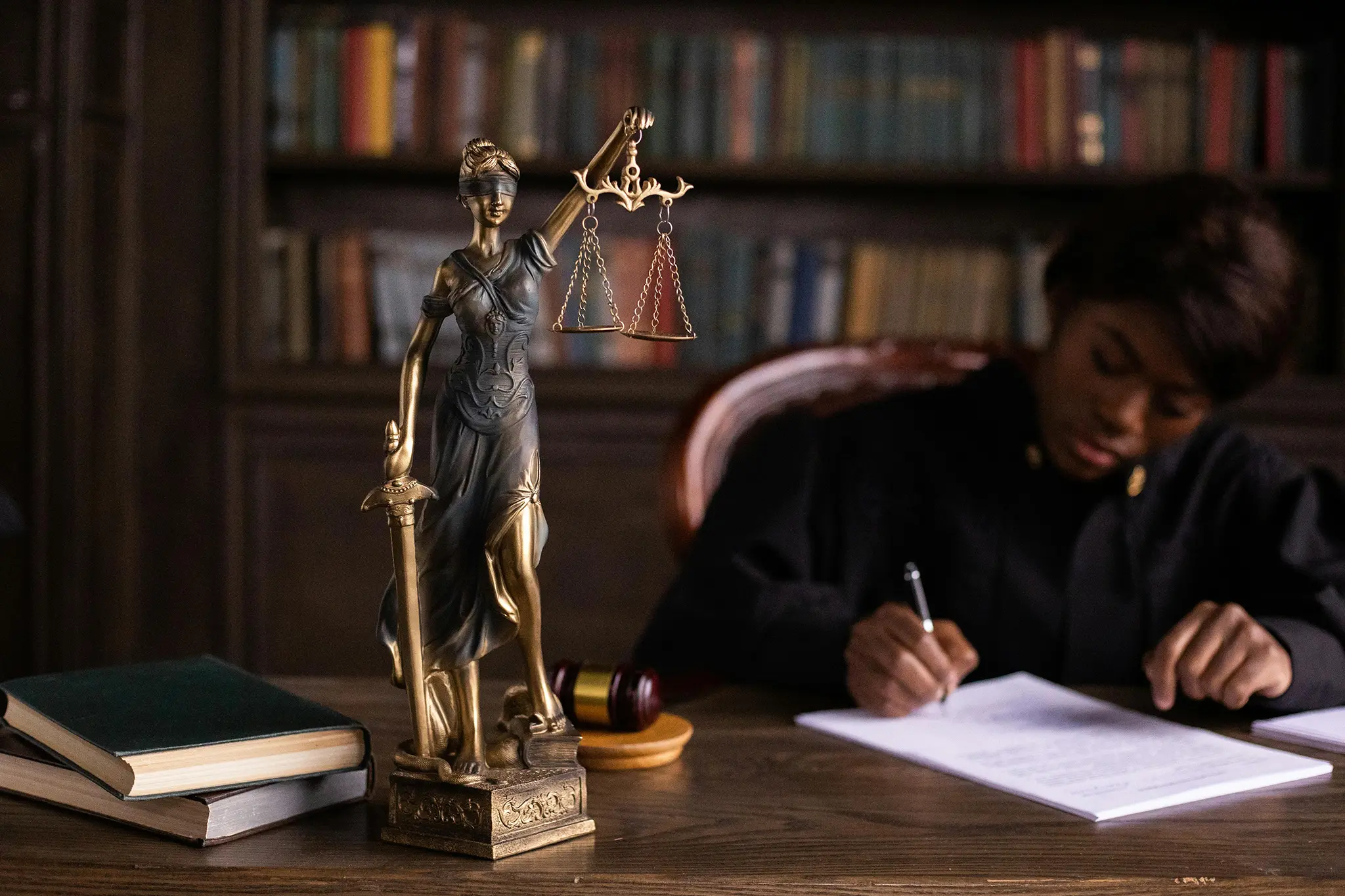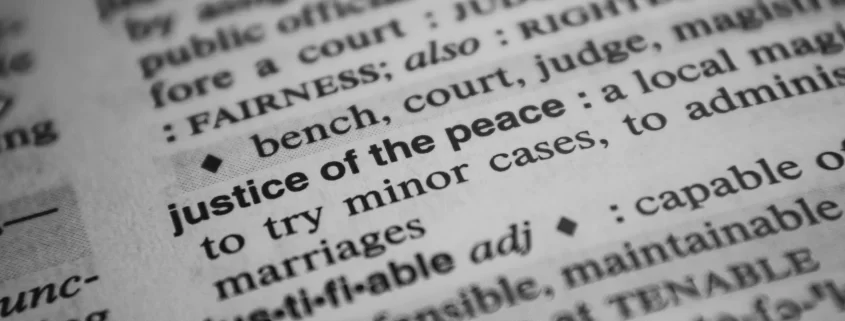Common Legal Terms
Almost every field comes with its own set of jargon that really only makes sense to the people in that field. The law is certainly no exception. We’d like to demystify some of that jargon. Below is a list of 50 common legal terms you might encounter and what they mean.
Acquittal—An acquittal occurs when a judge or jury finds a criminal defendant to be not guilty.
Ad hoc—Latin for “for this purpose.” It refers to something created or designed for a specific purpose, and perhaps something done with a clear plan but specific to the task at hand, without precedent.
Ad hominem—Latin for “to the person.” It refers to an attack on an individual’s character instead of addressing an argument.
Admissible—Evidence that may be considered by either a judge or jury during legal proceedings. Admissible evidence must be relevant to the case. That means it must have some logical tendency to prove or disprove a fact at issue. There are certain categories of evidence that are never admissible. If the evidence may not be considered, it is inadmissible.
Affidavit—An affidavit is a written statement made under oath. It is often used as evidence during court cases.
Amicus Curiae—Latin for “friend of the court.” This phrase refers to someone who provides information to the court but is not directly involved with the case.
Arraignment—An arraignment is the first court appearance after a criminal defendant has been arrested. A judge will read the charges against the defendant and obtain contact information to be used for future hearings. The judge may also set bail.
Bail—Money paid to the court that ensures a defendant will appear for court dates.
 Bench Trial—This is a trial before a judge without a jury. Bench trials can be faster than jury trials and, in some cases, more strategically advantageous. You may want a bench trial if the issues are novel or involve the complexities of the law a jury might not fully grasp, or if you think the jury will be too emotionally biased.
Bench Trial—This is a trial before a judge without a jury. Bench trials can be faster than jury trials and, in some cases, more strategically advantageous. You may want a bench trial if the issues are novel or involve the complexities of the law a jury might not fully grasp, or if you think the jury will be too emotionally biased.
Brief—This is a written statement that details the facts and arguments of one side of a case. Briefs are submitted during a trial and attempt to persuade the court to take that side.
Burden of Proof—This refers to the obligation to produce evidence and prove a claim in court. For criminal trials, prosecutors must prove a defendant’s guilt “beyond a reasonable doubt.” This means a prosecutor must show no reasonable minds could disagree that the defendant is guilty. For civil trials, plaintiffs must prove their case with a “preponderance of evidence.” A preponderance just means “greater than 50%.” In a civil case, the plaintiff must only prove it is more likely than not that their view of the facts is correct.
Concurrent Sentence—Concurrent sentences are prison sentences that are served at the same time, so that the actual sentence only consists of the longest of the concurrent sentences. Judges use this to sentence a defendant for multiple crimes as part of the same conviction.
Consecutive Sentence—Consecutive sentences are prison sentences that are served one after the other. Rather than serving simultaneously like in concurrent sentences, consecutive sentences take the total of all sentencing time. A defendant has to be paroled or complete one of the consecutive sentences before serving the next, so that a defendant can actually get paroled without serving the time on each specific count but then has to start serving the next count.
De Facto—Latin for “in fact.” This describes something that is true in practice, even if it’s not legally recognized.
De Jure—Latin for “by law.” This describes something that is legally recognized and established, even though it might not be the truth in fact.
Defamation—This refers to a false statement that harms an individual’s reputation and leads to legal claims for damages. There are two common types of defamation: libel and slander. Libel refers to false statements that are made in writing. Slander refers to false statements that are made orally.
Defendant—A defendant is the party being charged in either a criminal or civil lawsuit.
Discovery—Discovery refers to the process by which parties in a lawsuit gather and exchange evidence and information before going to trial.
Docket—This refers to a log of the history of each case tried in a court. There are typically brief entries in chronological order that summarize what happened during the proceedings.
Double Jeopardy—A legal principle that prevents an individual from being tried or punished twice for the same crime in the same jurisdiction. The protections provided by double jeopardy are meant to prevent an individual from being unfairly targeted or harassed by the legal system. There are some exceptions, like differing jurisdictions (state v. federal), mistrials, and/or appeals.
 Due Process—This is the right to a fair and impartial legal process. What “process” is “due” can be complex and subtle. It will depend on how important the rights at stake in the “process” are. But almost always, due process requires notice to the person who could be harmed by the process, an opportunity to present their evidence, and a right to a neutral, impartial decisionmaker. Due process in a criminal case involves many different rights for the defendant. It can also involve civil matters such as loss of a driver’s or professional license, taxation, or changes in human-services benefits.
Due Process—This is the right to a fair and impartial legal process. What “process” is “due” can be complex and subtle. It will depend on how important the rights at stake in the “process” are. But almost always, due process requires notice to the person who could be harmed by the process, an opportunity to present their evidence, and a right to a neutral, impartial decisionmaker. Due process in a criminal case involves many different rights for the defendant. It can also involve civil matters such as loss of a driver’s or professional license, taxation, or changes in human-services benefits.
Ex Parte—Latin for “from one party.” This refers to a legal proceeding in which only one party is present.
Felony—A felony is a criminal charge reserved for the most severe types of crime. There are three grades (First Degree Felony, Second Degree Felony, and Third Degree Felony) that determine any jail time and/or fines associated with each criminal charge.
Habeas Corpus—Latin for “You shall have the body.” Habeas Corpus is a writ that protects an individual’s right to not be unlawfully detained. It requires the government to prove it has a right to detain a person. But after trial, the writ of Habeas Corpus disappears, and the defendant must seek relief through the Post-Conviction Relief Act procedure.
In Camera—Latin for “in private.” This refers to closed-door proceedings, or proceedings that take place in front of a judge and away from a jury or the public. These often involve the court questioning a minor or reviewing sensitive documents that might or might not need to be disclosed in discovery.
In Forma Pauperis—Latin for “in the manner of a poor person.” This refers to a legal status granted to individuals who cannot afford court fees. It is intended to ensure individuals who lack financial means are not denied access to legal rights and remedies.
Indictment—An indictment is a formal charge, often reserved for felonies, issued by a grand jury after the grand jury has reviewed a prosecutor’s evidence. A grand jury is like a trial before a trial. The prosecutor must present evidence of suspicion to the grand jury, and if the grand jury determines there is sufficient evidence that the defendant may be guilty, the case will then go to a trial.
Injunction—An injunction is a court order requiring one party to either refrain from specific actions or perform specific actions. Examples of injunctions include restraining orders, cease-and-desist orders, and requirements that a neighbor remove an obstruction that is interfering with an owner’s property.
Ipso Facto—Latin for “by the fact itself.” This term describes something that occurs as a result of an action.
Jurisdiction—This refers to a court’s legal or geographical authority to hear and decide certain cases. Without jurisdiction, no action a court can take will be legitimate or have authority. The court requires jurisdiction both over the person and over the issue, the subject matter of the dispute.
Jury—A jury is the group of people selected to hear a trial and render a verdict. Jurors are summoned from motor vehicle and voter registration lists. They will then be questioned by the attorneys from both sides and the judge to determine if any biases exist. Criminal trials typically have 12 jurors and civil trials can have anywhere from 6 to 12 jurors.
Lien—A lien is a legal claim made against an individual’s property in order to secure payment of a debt. If you sell property subject to a lien, the lien must be paid out of the sale price to clear the property for the next owner. A lien may also allow the lienholder to force the sale of the property to satisfy the lien.
Litigation—Litigation refers to a legal case or lawsuit. Plaintiffs and defendants can be referred to as litigants, and attorneys are litigators.
Mens Rea—Latin for “guilty mind.” This refers to the intent or mental state behind a criminal act. In the American legal system, a conscious intent to commit a crime with a guilty state of mind is almost always required, particularly for serious offenses. Mens rea may refer to a state of mind like intent to commit the crime, or a person causing harm recklessly or negligently. Some crimes—like murder—have complicated schemes where different mens rea lead to different levels of guilt. Others do not, such as parking, traffic, and alcohol-related offenses. It does not matter what your intent is if you are caught speeding, for instance.
 Miranda Rights—Rights read to an individual who has been taken into custody before any interrogations take place. These are an extension of Fifth Amendment rights. The U.S. Supreme Court has decided that interrogations in police custody are so inherently psychologically coercive that the individual must be given these notices to protect their right not to incriminate themself. This is actually a unique facet of the American legal system. For instance, if a person wishes to stop answering police questioning, the police must stop. This is not true in many countries.
Miranda Rights—Rights read to an individual who has been taken into custody before any interrogations take place. These are an extension of Fifth Amendment rights. The U.S. Supreme Court has decided that interrogations in police custody are so inherently psychologically coercive that the individual must be given these notices to protect their right not to incriminate themself. This is actually a unique facet of the American legal system. For instance, if a person wishes to stop answering police questioning, the police must stop. This is not true in many countries.
Misdemeanor—A misdemeanor is a criminal charge reserved for crimes that are worse than summary offenses but not as bad as felonies. There are three degrees of misdemeanors that determine any jail time and/or fines associated with each criminal charge.
Nolo Contendere—A Latin term that translates to “I do not wish to contend it.” A nolo contendere is a criminal plea in which the defendant does not admit guilt but accepts punishment, saying the evidence is sufficient to convict them without admitting they did, in fact, commit the crime. People sometimes use these where an admission to actually committing the crime could lead to a civil lawsuit.
Plaintiff—A plaintiff is the person filing a lawsuit in civil law.
Plea Bargain—An agreement between a prosecutor and defendant that resolves the case without going to trial. A plea agreement will usually include a specific sentence compromised between prosecutor and defense counsel. The courts usually honor these agreements for sentence.
Power of Attorney—A Power of Attorney is a legal document that grants authority to one person (an agent) to act on behalf of another person (a principal) in legal and financial matters. These often involve people who are legally incapacitated for one reason or another, such as due to health concerns.
Prosecution—Prosecution refers to the government’s attempt to prove a person guilty of a crime at trial.
Pro Bono—Latin for “for the good.” This refers to legal work that is done for free or at a reduced cost for the benefit of society, usually by an attorney volunteering.
Pro Tempore—This is sometimes shortened to “pro tem.” It’s a Latin phrase that means “temporary” or “for the time being.”
Quid Pro Quo—Latin for “something for something.” This refers to a reciprocal exchange of something of value.
Sanction—A sanction is a penalty, punishment, or coercive measure imposed by the court when an individual fails to comply with regulations. Sanctions can range from fines, orders, and restrictions to suspensions from the practice of law, and even imprisonment.
Statute of Limitations—This refers to the time limit an individual has to initiate a legal action. In most cases, once the statute of limitations has run out, the right to sue has been lost.
Subpoena—Latin for “under penalty.” A subpoena is a legal order for someone to appear in court as a witness or to produce evidence.
Tort—A tort is a civil (not criminal) wrong that leads to a lawsuit for damages.
Warrant—A warrant refers to the authorization from a court given to law enforcement to arrest someone or conduct a search.
Writ—A writ is a formal written order issued by a court.



